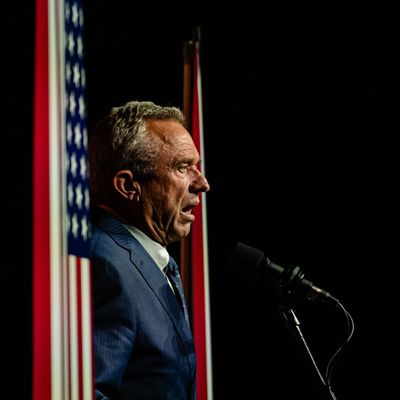

Photo: Jon Cherry/Getty Images
Most of the buzz surrounding Kamala Harris’s replacement of Joe Biden as the presumptive 2024 Democratic presidential nominee has come from the revived intraparty enthusiasm she has generated and her stronger performance in general-election polls against Donald Trump. But separately from and perhaps contributing to this Democratic comeback narrative has been a notable fall in the political standing of independent presidential candidate Robert F. Kennedy Jr.
In the RealClearPolitics averages of national presidential polls that include Kennedy and other non-major-party candidates, RFK Jr. dropped from 8.7 percent before Biden withdrew from the race to 5.8 percent now. Looking at longer trends, Kennedy was at 10.3 percent in the RCP averages as recently as July 6. So it’s been a pretty steep downward drop for the former Democrat. And in terms of his personal favorability, he’s been struggling for a while. FiveThirtyEight’s averages showed RFK Jr.’s favorability ratio going underwater on May 14, and is now at 33.7 percent favorable–41.5 percent unfavorable.
There are a number of factors hurting Kennedy’s candidacy right now. Perhaps the most obvious is the abrupt decline in the supply of “double-haters” (voters who gave both major-party candidates unfavorable ratings) from which the indie candidate naturally fed. The Times-Siena pollsters showed double-haters declining from 20 percent before Biden dropped out to 8 percent afterward. That seems to be the consequence of improvements in favorability for both Trump and Harris, squeezing Kennedy from two directions. An additional problem for Kennedy is Harris’s gains over Biden among Black, Latin, and under-30 voters, all major reservoirs of support for RFK Jr.
What’s unclear is whether the apparent reset of the presidential contest is the principal source of Kennedy’s misery or if instead (or in part) we’re just at that point in the election cycle when non-major-party candidates tend to fade. Kennedy has some additional problems that don’t directly stem from Harris’s or Trump’s standing, most notably a money shortage, as The Hill reports:
Federal Election Commission filings show Kennedy spent nearly $1 million more than he took in last month and that the campaign is also carrying debt of approximately $3 million …
His biggest super PAC, American Values 2024, brought in a modest $228,000 in June, according to the FEC.
It’s unclear how deep RFK Jr.’s most important funding source, his running mate Nicole Shanahan, is willing to dig into her personal wealth to keep the campaign going. But it is clear most of the dough is going to the very difficult and intermittently successful effort to get the ticket onto general-election ballots. According to the New York Times, the Kennedy-Shanahan ticket is on the ballot in just 13 states at the moment, including just one battleground state (Michigan), though that number is sure to rise.
As for Kennedy’s strategy moving forward, it’s not very clear. His conversations with Trump during the Republican National Convention fanned Democratic fears that the wiggy anti-vaxx pol might be joining the MAGA cause. If that’s not in the cards, RFK Jr. still has his previous strategy, which focused on making the stage in the second presidential debate in September that Biden and Trump agreed to back in June. But it’s unclear if the ABC debate for September 10 is still on. And Kennedy’s lagging poll numbers (he’ll need 15 percent of registered or likely voters in four high-quality national polls, a level he hasn’t reached in a good while) mean he likely won’t make the grade even if he meets the debate’s ballot-access requirements.
In retrospect, the end of the much-loathed Biden-Trump rematch probably spelled the end of the Kennedy campaign as an ongoing enterprise. But he and his supporters can still make a difference on the margins, where close elections are often decided.
Source link




